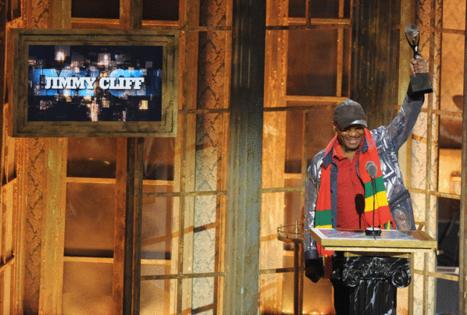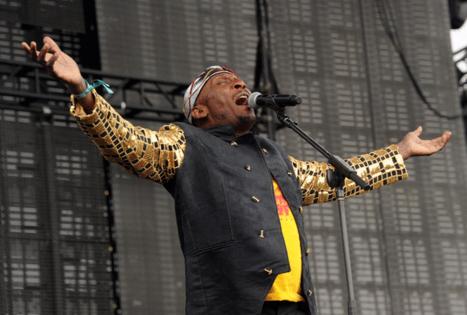Legendary reggae icon, Grammy winner Jimmy Cliff is dead at 81
Published in Entertainment News
For many Americans, it was their first introduction to urban Jamaican life and culture, with its satirical take on social conflicts. But for singer Jimmy Cliff, the 1972 film “The Harder They Come,” would not only make him part of a cult classic, but it would help propel his career and reggae music to international audiences.
Cliff, a legendary reggae artist who earned his place in the Rock and Roll Hall of Fame, died Monday. He was 81.
His wife, Latifa Chambers, said in an Instagram post that the cause of death was a seizure followed by pneumonia.
“It’s with profound sadness that I share that my husband, Jimmy Cliff, has crossed over,” she wrote. “To all his fans around the world, please know that your support was his strength throughout his whole career.”
The message was also signed by their children, Lilty and Aken, and his death came a day after Haiti also lost a legendary musician, André Dadou Pasquet. He died in Miami on Sunday at at age 72. A former member of world renown Tabou Combo, Pasquest is the founder of Magnum Band.
In a post, Jamaica Prime Minister Andrew Holness called Cliff “a true cultural giant whose music carried the heart of our nation to the world.”
“Through timeless songs like ‘Many Rivers to Cross,’ ‘The Harder They Come,’ ‘You Can Get It If You Really Want’ and ‘Sitting in Limbo,’ Jimmy Cliff told our story with honesty and soul,” Holness said. “His music lifted people through hard times, inspired generations and helped to shape the global respect that Jamaican culture enjoys today.
“We give thanks for his life, his contribution, and the pride he brought to Jamaica. I extend heartfelt condolences to his family, loved ones, and to every Jamaican, I know we feel this loss deeply,” the prime minister added. “Walk good, Jimmy Cliff. Your legacy lives on in every corner of our island and in the hearts of the Jamaican people.”
In 2010 Cliff was inducted into the Rock and Roll Hall of Fame, where he accepted the award “on behalf of the people of the Caribbean, Africa, South America, Europe and Asia, all the world because these are the people who have supported me all along.”
Haitian music star Wyclef Jean was tapped to do the honors.
“I wouldn’t be here without Jimmy Cliff. It’s just natural,” Jean said after the Hall of Fame ceremony. Cliff, he said inspired the spirituality in his own music as well as “my swag.”
“He was like a godfather, a mentor, before I even made it,” Jean told the Herald on Monday.
The two were so close that “Jimmy actually slept in my apartment,” recalled Jean. “We have a long history.”
While Jamaica folk music was part of Cliff’s inspiration, so too was rock and roll music and artists like Sam Cooke, Ray Charles and Jimi Hendrix, he would say in interviews. Among his honors were the Order of Merit, the highest recognition by the Jamaican government for achievements in the arts and sciences, and two Grammy Awards for best reggae album — “Cliff Hanger” in 1985 and “Rebirth” in 2012.
From rural Jamaica to world stage
Born James Chambers in July 1944 in Saint James’ Parish in western Jamaica, Cliff was the second to last of nine children. In an interview with the Guardian, he said his mother wasn’t around when he was a child, and he was raised by his father and grandmother. While the former was not a fan of his singing what he called the“devil” music, the latter encouraged his singing.
“I was always singing — but I was told I was singing the songs of the devil. My grandmother, though, always said: ‘Leave the boy alone. He’s going to come to something one day,’ he recalled.
In his early teens he moved to Kingston, where he lived in the slums, to pursue music. His talents later took him to England, where he would begin to make a name for himself as an artist signed to the Island Records label.
However, it was the 1972 cult classic, “The Harder They Come,” which would later be transformed into an equally popular stage play, that propelled him to stardom even as his career got overshadowed by another reggae icon, Bob Marley.
In the film, Cliff starred as an aspiring singer turned outlaw and hero of the poor after killing a cop. The screenplay by Jamaicans Perry Henzell, a director who did commercials, and Trevor Rhone, who wrote plays, was loosely based on the true story of a Jamaican outlaw gunned down by the police in 1948. The guy, Ivanhoe “Rhygin” Martin, taunted cops by writing “I was here, but I disappear” on walls. Cliff wrote and performed several now-classic songs for the film.
In a 2009 interview with the Herald, Cliff said the movie “really propelled me to another level, all over the world. I was big in Europe, but not that big in the United States. I couldn’t have toured there for two to three months, as I did after the movie.”
At the time, Cliff was an Islands Record artist, and founder Chris Blackwell took advantage of the movie’s success —it broke Jamaican box office records — by booking Marley for concerts in cities where the film had played. This led to reggae’s dominance outside the island.
Cliff won his share of supporters among other artists. Bob Dylan once reportedly described Cliff’s 1969 politically charged song “Vietnam” as “the best protest song ever written.”
The song, Cliff, would later say reflected the essence of his music, which was one of struggle: “What gives it the icing is the hope of love.”
©2025 Miami Herald. Visit at miamiherald.com. Distributed by Tribune Content Agency, LLC.
















Comments